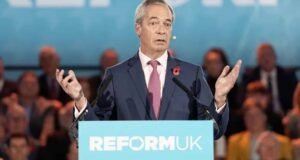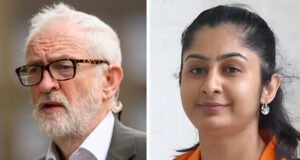 David Cameron has promised to lead a government for “one nation” and make “Great Britain
David Cameron has promised to lead a government for “one nation” and make “Great Britain
greater” as he returned to Downing Street as prime minister.
Speaking outside No 10 after visiting Buckingham Palace, he said the UK was “on the brink of
something special”.
The Conservatives have 330 seats – four more than needed for a Commons majority – their first such
victory since 1992.
Mr Cameron’s rivals Ed Miliband, Nick Clegg and Nigel Farage have all resigned after election
disappointment.
The Conservative leader is now beginning the process of putting together the new government, with
senior Cabinet appointments expected to be announced later on Friday.
Mr Cameron said he would reach out to all parts of the UK and strive to “bring the country
together” in the wake of the SNP’s election landslide in Scotland – where it won 56 of the 59 seats.
In other election developments:
With only one result to go, the BBC forecasts that the Conservatives will end up with 331 seats in
the House of Commons, 24 more than in 2010. Labour will end up with 232, the Lib Dems 8, the SNP
56, Plaid Cymru 3, UKIP 1, the Greens 1 and others 19.
The Conservatives are expected to get a 36.9% share of the UK national vote, Labour 30.5%, UKIP
12.6%, the Lib Dems 7.8%, the SNP 4.7%, the Green Party 3.8% and Plaid Cymru 1%.
Ed Miliband steps down after a “difficult and disappointing” night for Labour which saw Ed Balls
lose and Jim Murphy and Douglas Alexander defeated by the SNP
Nick Clegg said he would quit as leader after a “crushing” set of losses, which saw Vince Cable,
Danny Alexander, David Laws, Simon Hughes and Charles Kennedy among a slew of Lib Dem
casualties
Nigel Farage has quit as UKIP leader after failing to be elected – although he may stand in the
ensuing leadership contest. He has recommended Suzanne Evans take over as interim leader
George Galloway, who was reported to the police for retweeting an exit poll before voting ended,
has lost to Labour in Bradford West
Conservative minister Esther McVey was the highest-profile Tory loser, defeated by Labour in Wirral
West as Boris Johnson returned to the Commons
The Green Party gets one seat after Caroline Lucas retains the Brighton Pavilion constituency she
won in 2010
Turnout is set to be 66%, marginally up on 2010 and the highest since 1997
An inquiry is to be held into the mismatch between opinion polls during the campaign and the
actual result
The Conservatives’ victory means they will be able to govern without the need for a coalition or a
formal agreement with other parties.
Mr Cameron said he had spoken to both Mr Miliband and Mr Clegg, paying tribute to the latter’s
contribution to the coalition government over the past five years.
“Part of me is happier than I have felt for many, many years”
Speaking in Downing Street, he said: “We will govern as a party of one nation, one United Kingdom.
“That means ensuring this recovery reaches all parts of our country, from north to south, to east to
west.”
He said he would press ahead with devolution of powers to all nations as well as referendum on the
UK’s EU membership.
“I have always believed in governing with respect,” he said “That’s why in the last parliament we
devolved power to Scotland and Wales, and gave the people of Scotland a referendum on whether
to stay inside the United Kingdom.
This has been an election which may have more profound consequences than almost any in living
memory.
We now face a generational decision about our future in Europe, with an EU referendum in two
years’ time almost certain.
There will also be serious questions about the future of the Union, following an SNP landslide that
has turned Scotland into a virtual one-party state.
David Cameron’s victory also represents a colossal achievement.
“In this parliament I will stay true to my word and implement as fast as I can the devolution that all
parties agreed for Wales, Scotland and Northern Ireland.”
George Osborne, who is expected to remain as chancellor, said the Conservatives had been “given a
mandate to get on with the work we started five years ago” and would follow the “clear
instructions” of the British public.
Speaking at Labour’s London headquarters, Mr Miliband said he had phoned David Cameron to
congratulate him on his victory.
He said he would step down as leader with immediate effect after Labour won 26 fewer seats than
in 2010, adding that deputy leader Harriet Harman would succeed him pending a leadership contest.
Ed Balls was one of the night’s highest-profile casualties
Labour, he said, needed an “open and honest debate about the way forward without constraints”.
“I am truly sorry that I did not succeed,” he told party supporters. “I have done my best for nearly
five years.”
He added: “Britain needs a strong Labour Party. Britain needs a Labour Party that can rebuild after
this defeat. We have come back before and we will come back again.”
Announcing his own exit as leader after more than seven years, Mr Clegg said the results – which saw
his party reduced from 57 to eight seats – were the most “crushing blow” to the Liberal Democrats
since they were formed in the late 1980s.
“This is a very dark hour for our party,” he told party supporters in London. “But we cannot and we
will not allow the values of liberalism to be extinguished overnight. Our party will come back. Our
party will win again.”
David Cameron has been congratulated on his victory by a number of foreign leaders.
Jean-Claude Juncker, president of the European Commission, said he would work constructively with
the new UK government and would consider “proposals, ideas or requests” about the UK’s
membership “in a very polite, friendly and objective way”.
Labour election results: Ed Miliband
Ed Miliband is stepping down as Labour leader after his party’s disappointing general election showing.
Labour suffered heavy losses at the hands of the SNP, with the Tories forecast to achieve a majority.
In a speech in London, Mr Miliband said it was “time for someone else” to take over the leadership and that he was “truly sorry” he did not succeed.
Shadow chancellor Ed Balls was among the party’s big-name casualties.
It also lost its election campaign chief Douglas Alexander and its leader in Scotland Jim Murphy.
‘Deeply sorry’
Mr Miliband was applauded by staff as he arrived at Labour headquarters in central London.
He confirmed deputy leader Harriet Harman would be interim leader, and that he would step
down after the VE Day commemorations later on Friday.
“I joined this party aged 17,” he said. “I never dreamed I’d lead it.”
He may have served in Gordon Brown’s cabinet, but few people outside politics had heard of Ed
Miliband before he was elected leader of the Labour Party in 2010, a post he has now
relinquished in the wake of Labour’s election defeat.
He had spent much of the first 40 years of his life in the shadow of his older brother David, the
former foreign secretary.
He did the same course – Philosophy, Politics and Economics – at Oxford University, at the same
college, and followed David into a similar backroom role in the Labour Party, albeit on different
sides of the Tony Blair/Gordon Brown divide. The two even lived in neighbouring flats in the
same building for a while.
Mr Miliband said he had done his best for five years, and that it was “not simply leadership that
achieves change”.
“I will never give up on fighting for the Britain that I believe in,” he said.
He urged supporters not to “mourn” the defeat.
“We have come back before and this party will come back again,” he added.
Speaking earlier after retaining his Doncaster North seat, Mr Miliband said his party had been
overwhelmed by a “surge of nationalism”.
Party
Ms Harman confirmed she would step down as deputy leader once the new leadership is in
place.
Labour MP Tom Watson – the party’s former campaign co-ordinator – confirmed that he would
consider running to replace her.
“I’ve always thought that the deputy leader role is the campaigning role,” he told BBC News.
“We’ve got a mayoral election in Tower Hamlets to fight in six weeks’ time. Who knows, we might
even have a by-election for London mayor.
“So this party has got to keep campaigning whilst we try and understand what’s gone on in the
general election.”
Mr Balls lost his Morley and Outwood seat to Conservative candidate Andrea Jenkyns by 422
votes.
“Any personal disappointment I have at this result is as nothing compared to the sense of sorrow
I have at the result Labour has achieved across the UK, and the sense of concern I have about
the future,” he said.
Mr Balls said questions would arise about the future of the United Kingdom and Britain’s position
in Europe over the next five years.
Labour also lost previous leader Gordon Brown’s former constituency to the SNP as the
nationalist party almost swept the board in Scotland.
Mr Alexander lost his seat to a 20-year-old student after a massive 26.9% swing from Labour to
the SNP in Paisley and Renfrewshire South.
Conceding defeat, Mr Murphy said: “The party that has traditionally been the tireless champion of
the underdog now finds itself in the position of being the underdog.
“Scotland needs a strong Labour Party and our fight-back starts tomorrow morning.”
Former Labour Home Secretary Lord Reid told the BBC “changing the captain” would not
necessarily improve Labour’s electoral prospects.
“They (the public) thought we were on the wrong side of all the major arguments – our economic
competence, on the question of creating wealth rather than just distributing wealth, on the
question of immigration, on the question of reform of the public services,” he said.
Another Labour peer, former First Minister Lord McConnell, said his party had experienced a
“catastrophic night”.
“I think the Labour strategy for this election was always going to end up in this situation,” he said.
“The idea that we could poll between 30 and 35% and pull off a victory was not going to work.”
Election results: Nick Clegg resigns after Lib Dem losses
Nick Clegg has resigned as Liberal Democrat leader after his party was routed at the general election.
The Lib Dems are set to end up with just eight MPs, down from 57 in 2010.
Energy Secretary Ed Davey, Business Secretary Vince Cable and Treasury Secretary Danny Alexander
all lost their seats.
Mr Clegg said the results were “immeasurably more crushing” than he had feared, saying it had been
a “huge honour” to lead the party.
In a speech in London, he confirmed a leadership election would now take place to replace him.
“It’s simply heartbreaking to see so many friends and colleagues who have served their constituents
over so many years abruptly lose their seats because of forces entirely beyond their control,” he
said.
‘Terrible night’
Mr Clegg, who held seats, added that “fear and grievance have won, liberalism has lost”.
History would judge his party more kindly than the electorate, he said, pointing to some of the
measures the Lib Dems had championed in government.
Other senior Lib Dems to fall were former schools secretary David Laws, former party leader Charles
Kennedy and former deputy leader Simon Hughes.
Mr Davey, previously tipped as a possible party leader, lost his Kingston and Surbiton seat to the
Conservatives.
Nearby in south west London, Mr Cable lost his Twickenham seat, also to the Conservatives.
Both attributed their defeats to a combination of coalition and Conservative warnings about the
threat of a Labour/Scottish National Party administration.
Nick Clegg’s political journey has seen him win a bitter Liberal Democrat leadership battle, rise to
become deputy prime minister, and face furious criticism over his U-turn on tuition fees.
But despite retaining his own parliamentary seat in 2015, he has resigned as Lib Dem leader after
disastrous election results saw the party crushed at the polls.
He was once mentioned in the same breath as Winston Churchill and took his party up to notable
highs and now down to painful lows in its popularity.
Mr Davey said his party had “paid some price” for joining a coalition government but he had “lost on
Conservative warnings” of a Labour government propped up by the SNP.
Mr Cable said it had been “a terrible night”, but the party would “bounce back”.
Mr Alexander told the BBC: “I lost my seat, that’s democracy. Worse things happen to people.”
He said he hadn’t expected the results to be “as bad as this”, and said the party had “a lot of thinking
to do about how to keep the flame of liberalism alive” against what he described as “the forces of
nationalism and anti-Europeanism”.
Former Lib Dem leader Paddy Ashdown told the BBC he was “immensely proud that we put the
national interest first” by forming a coalition in 2010, adding: “We will be back.”
Norman Lamb, who served as a coalition health minister and who held on to his Norfolk North seat,
said it felt like an “unwritten rule of politics” that the smaller party in a coalition “loses out”.
Veteran Lib Dem MP of 32 years Simon Hughes lost his Bermondsey and Old Southwark seat in
London to Labour’s Neil Coyle.
In Scotland, Charles Kennedy, MP for Ross, Skye and Lochaber for 30 years, and leader of the party
from 1999 to 2006, lost his seat to the SNP.
Lib Dem employment minister Jo Swinson lost her East Dunbartonshire seat to the SNP’s John
Nicolson with a swing of 16%.
Home Office minister Lynne Featherstone and whip Jenny Willott also lost their seats.
Former Liberal Democrat president Tim Farron successfully held his seat in Cumbria’s Westmorland
and Lonsdale.
Paddy Ashdown: “It’s the very last time I will question a BBC exit poll”
Scottish Secretary Alistair Carmichael was re-elected in his Orkney and Shetland seat in Scotland,
despite a swing to the SNP of 24%.
Earlier in the evening, Lord Ashdown said he would “publicly eat his hat” if predictions the party
would lose 47 seats were correct.
He told the BBC this was a “certain error” and the party’s own polling indicated it would fare better.
He later admitted it had been a “bitter, painful and cruel” night for the Liberal Democrats – and
accepted that he “now has to eat his hat”.
Many Lib Dems have lost their £500 deposit, which is not returned to candidates who get below 5%
of votes cast.
The party did not lose any deposits in the 2010 general election.
On the eve of the election Mr Clegg insisted his party would be the “surprise story” of polling day,
defying predictions of an electoral mauling.
Mr Lamb, who is widely expected to stand for the leadership of his party, said the Liberal Democrats
needed a “period of reflection”.
“It’s not a good time to be making big decisions when we’re all utterly exhausted,” he said.
 Weekly Bangla Mirror | Bangla Mirror, Bangladeshi news in UK, bangla mirror news
Weekly Bangla Mirror | Bangla Mirror, Bangladeshi news in UK, bangla mirror news









